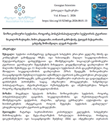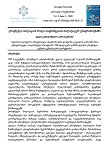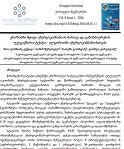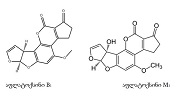Ecological Impact of COVID-19 Pandemic: Changes in Ambient Air Quality in Major Cities of Georgia

Downloads
This study aims to evaluate the changes in ambient air quality in major urban centres of Georgia-Tbilisi, Rustavi, and Batumi - during the period 2019 to 2023, encompassing the pre- and post-COVID-19 pandemic phases. The research focused on key atmospheric pollutants, including particulate matter (PM₁₀, PM₂.₅), nitrogen dioxide (NO₂), carbon monoxide (CO), ozone (O₃), and sulfur dioxide (SO₂). The collected data were processed and analysed using Microsoft Excel.
The findings indicate that air pollution remains a significant environmental and public health issue in the studied cities. Addressing this challenge necessitates the coordinated involvement of governmental bodies, the scientific community, and civil society.
To mitigate air pollution and improve air quality, the following measures are recommended:
expansion of the national air quality monitoring network, gradual replacement of aging vehicle with electric and hybrid alternatives, strengthened regulatory control over emissions from diesel-powered vehicles, development and maintenance of urban green spaces promotion and integration of renewable energy sources, adoption of energy-efficient construction technologies and practices.
Further research is recommended, particularly in regions with the highest pollution levels. Such studies should be conducted in parallel with epidemiological investigations into chronic non-communicable diseases, especially those affecting the respiratory system, in order to better understand the public health implications of long-term exposure to air pollutants.
Downloads
ნ. ვეფხვაძე, მ.ხორბალაძე, ი. კუგოტი, ნ. ცხოვრებაძე, თ. ქოჩორაძე-მარღიშვილი, ატმოსფერული ჰაერის ხარისხის შეფასება საქართველოს დიდ ქალაქებში (2019-2021 წწ.), თსსუ სამეცნიერო შრომათა კრებული, 2022, ტ. 56, გვ. 76-79.
ნ. ვეფხვაძე, მ. ხორბალაძე, ნ. კილაძე, ნ. ცხოვრებაძე, ი. ცხოვრებაძე, თ. ქოჩორაძე-მარღიშვილი, ი. კუგოტი, საქართველოს დიდი ქალაქების ატმოსფერული ჰაერის ზოგადი დახასიათება პრეკოვიდურ, კოვიდურ და პოსტკოვიდურ პერიოდში (2019-2023 წწ.), ექსპერიმენტული და კლინიკური მედიცინა, №4, 2023, გვ. 19-23
Annual Air Quality Reports (2019-2023) - National Environmental Agency of Georgia.
Dasandi N, Jankin S, Pantera DK, Romanello M. Public engagement with health and climate change around the world: a Google Trends analysis. Lancet Planet Health 2025; 9: e. 236–44
European Environmental Agency. Air Quality in Europe—2019 Report. Report Nº 10/2019. Available online: https://www.eea.europa.eu/publications/air-quality-in-europe-2019 (accessed on 7 April 2022).
European Environment Agency (EEA). Air Quality in Europe – 2020 Report. EEA09/2020 (published 23 November 2020)
European Commission. Directive 2008/50/EC on Ambient Air Quality and Cleaner Air for Europe. European Parliament and of the Council. 21 May 2008. Available online: https://www.eea.europa.eu/policy-documents/directive-2008-50-ec-of (accessed on 7 April 2022).
Lorenzo-Saez E., Coll-Aliaga E., Oliver-Villanueva J., Prieto del Campo F., Lerma-ArceV., Analysis of the COVID-19 Lockdown’s Impact on Air Quality in the Langer Cities of Spain, Sustainability 2022, 14(9), 5613.
. Manisalidis I, Stavropoulou E, Stavropoulos A, Bezirtzoglou E. Environmental and Health Impacts of Air Pollution: A Review. Front Public Health. 2020 Feb
doi: 10.3389/ fpubh.2020.00014
United States Environmental Protection Agency (EPA). "The Clean Air Act." EPA, 2020.
World Health Organization (WHO). "Air Pollution." WHO, 2025
World Health Organization. WHO Global Air Quality Guidelines. Particulate Matter (PM2.5 and PM10), Ozone, Nitrogen Dioxide, Sulphur Dioxide and Carbon Monoxide; World Health Organization: Geneva, Switzerland, 2021; Available online: https://www.who.int/publications/i/item/9789240034228 (accessed on 7 April 2022).
Copyright (c) 2025 Georgian Scientists

This work is licensed under a Creative Commons Attribution-NonCommercial-NoDerivatives 4.0 International License.

























































































































































































































